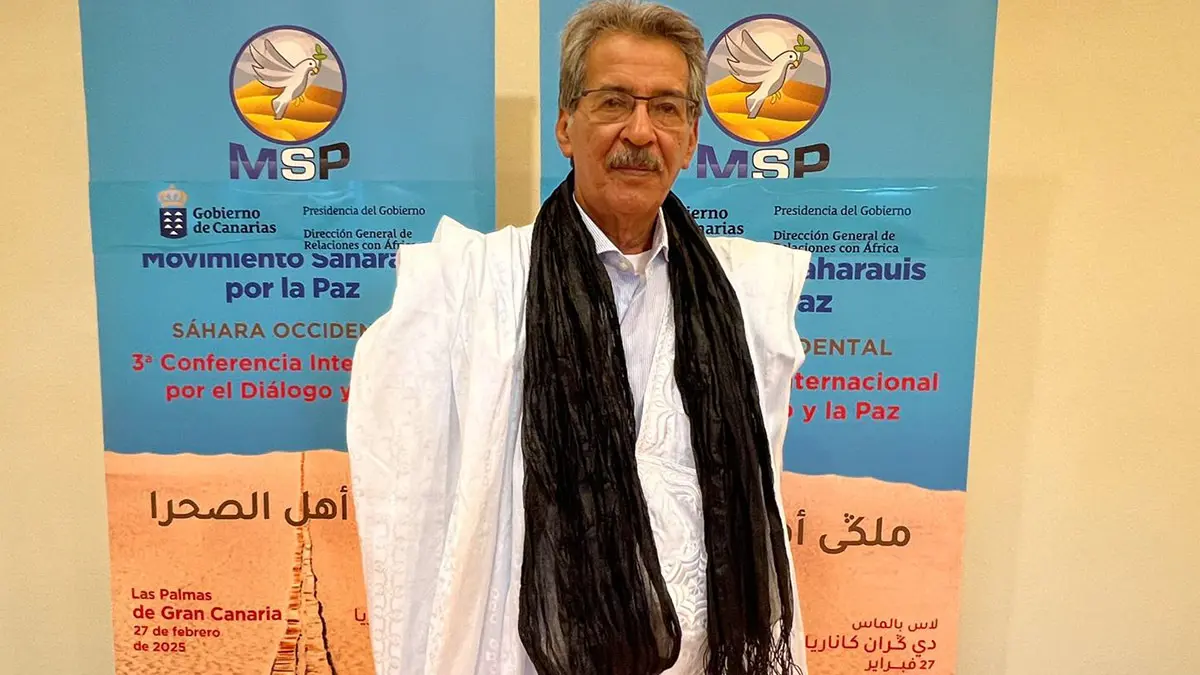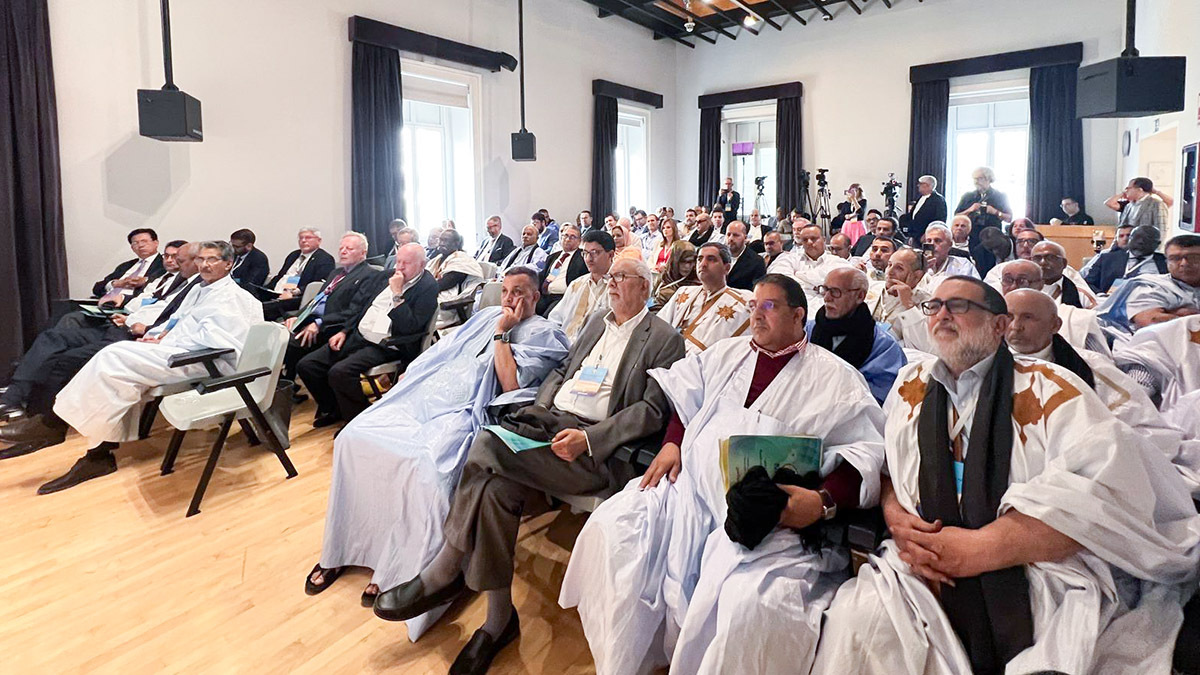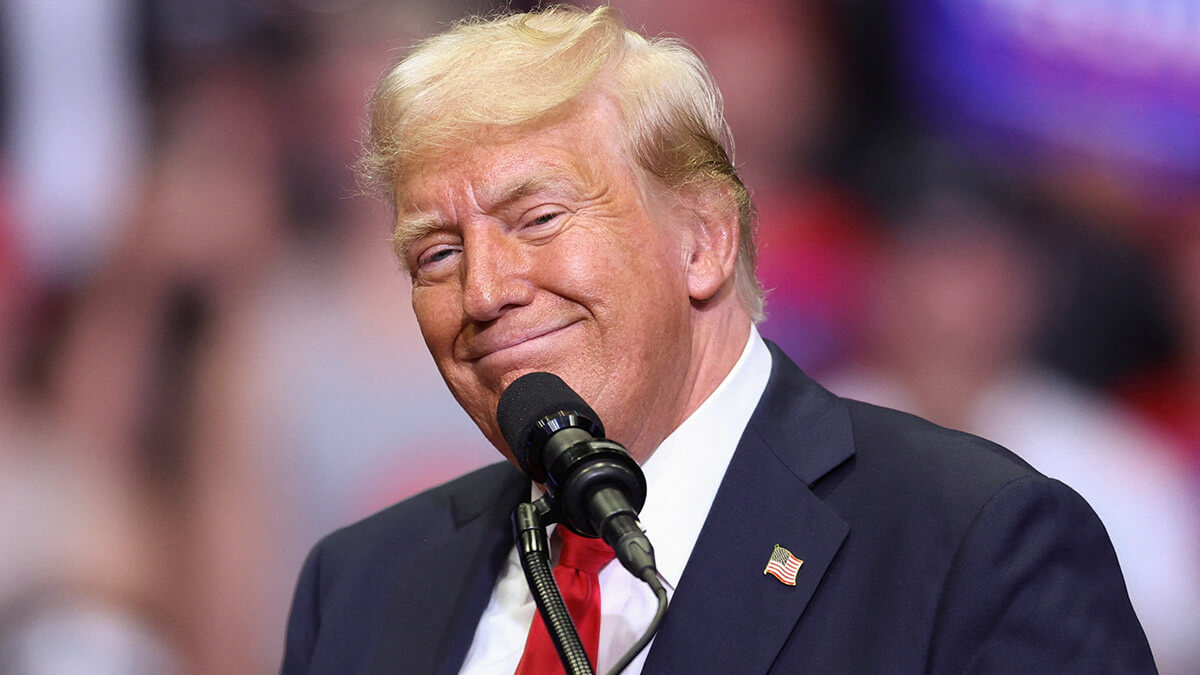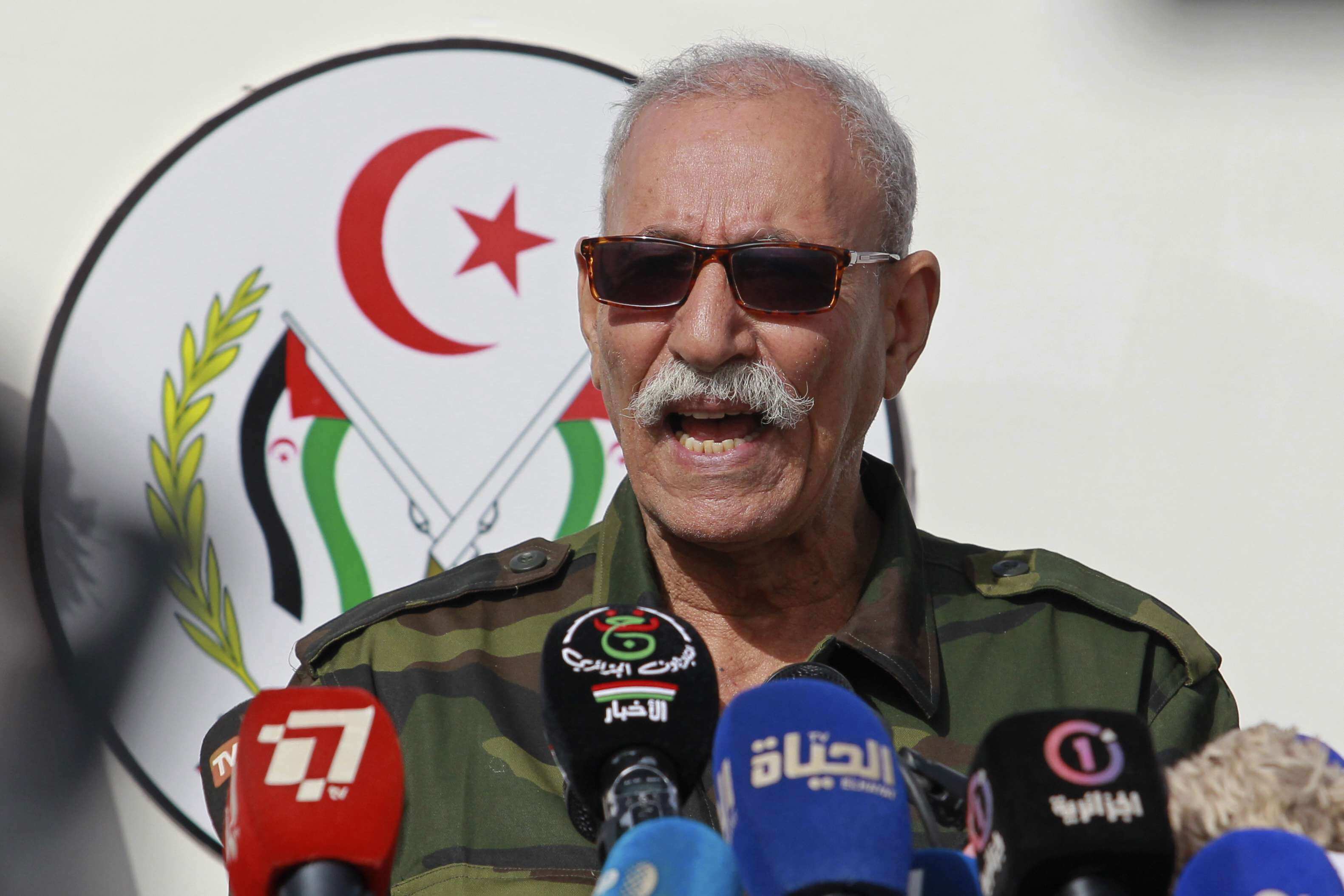Hach Ahmed Bericalla: ‘The Movement Saharawi for Peace seeks to be the interlocutor for peace in the conflict in Western Sahara’

The first secretary of the Movement Saharawi for Peace (MSP), Hach Ahmed Bericalla, analysed in the programme ‘De cara al mundo’ on Onda Madrid the III International Conference for Peace and Dialogue in the Western Sahara, held in Las Palmas de Gran Canaria, and the importance of reaching a peaceful solution to the conflict.
He also considered the points approved in the Canarian manifesto.
The Movement Saharawi for Peace presented its credentials at this conference with clear support from Saharawi representatives, tribal leaders and political leaders, experts and international personalities, so that the United Nations recognises its legitimacy as a representative of the Saharawi people and includes them in the process of negotiating a peaceful solution to the conflict that includes and supports the solution of broad autonomy under Moroccan sovereignty.
Indeed, we return to Las Palmas for yet another conference in this effort to strengthen the Movement Saharawi for Peace (MSP) as an emerging political organisation on the Saharawi scene.
This time, as well as the unanimous support of the tribal notables, who are an institution of great weight in Saharawi society regardless of the interplay of parties and political currents, we have the backing of the Socialist International, an organisation we have just joined and which is a powerful organisation made up of 130 political parties from all over the world, some of them social democrats, who currently hold power and that is very important.
It is an endorsement of the MSP's arguments, which consist of drawing attention to the need for a peaceful, political solution and, in a way, an appeal to the Polisario Front, the interlocutor, to make an effort to open the way for a peaceful solution because the military route is impossible. We have already put it into practice for a long time, we have seen the consequences and there is no point in continuing to drag the corpses of young Saharawis through the mud in a symmetrical war that cannot be won.
Therefore, what common sense dictates is to take advantage of the still existing interest on the part of the United Nations to find a political solution with international guarantees. We consider that the Moroccan proposal of autonomy, although it is not yet fully known, can be a starting point from which to explore an area of agreement with Morocco.
This is the message of the Saharawi Movement. At this third Conference, unanimous support has been achieved, not only from the Saharawis themselves, but also from representatives of very important political forces in the region in Morocco, in Mauritania, in Spain, which symbolises a good start for this approach to make headway and to be consolidated for the future.

Do you think that, given the current international situation, with everyone talking about Donald Trump, the great figure who, with his sometimes somewhat histrionic interventions, achieves a lot, that the Sahara problem can finally be solved, that Algeria and the Polisario Front will sit down to negotiate a solution based on the Moroccan proposal for autonomy?
The emergence of US President Donald Trump on the international scene has been a punch thrown on the international chessboard and the jolts have not yet been established to know to what extent this could also have consequences for the question of Western Sahara.
It is clearly a minor issue on President Trump's agenda, but in a way it is still a very sensitive area, as North Africa has been unstable for 50 years as a result of the conflict, and any US administration will be interested in appeasing the situation and finding a peace agreement that will clear up the prevailing instability in the area.
Frankly, I don't know if it's political intuition or the capacity for vision that I clearly don't have, but I have the feeling that 2025 is going to be an important year for the solution of the Western Sahara problem. Hopefully we are not wrong in our predictions and this time it will be different. Every year we swear that the following year will be the decisive one, but now the conditions are right to move forward or to step up efforts.
The United Nations has been involved and spending money on this operation for 30 years. I know that important figures and leaders or perhaps politicians close to the Trump administration are fed up with the United States spending money on unlimited and protracted peacekeeping operations and that, in a way, also puts pressure on the United Nations to tighten its belt and try to make the most of the time it has left with US resources to find a solution. This is an important element that will have to be processed by the United Nations operators, starting with the United Nations Secretary-General, and that, in my view, is an element that encourages us to think that 2025 will be an important year.

Out of interest, you have sent several letters to the UN Secretary-General's special envoy to the Sahara, Staffan de Mistura, asking him to intervene to stop the deaths of Saharawis in these attacks by the Polisario against Morocco. Morocco responds and young people die. Have you heard back from him or do you have any contact with Mr Staffan de Mistura?
Yes, I have an open line of communication and in a way he shares my concern about the pointless deaths of young Sahrawis in a symmetrical war. Imagine simple troops in a desert with conventional weapons against the powerful weapon of drones.
Wars are now only being fought with drones, the war in Ukraine and Russia, and also the conflict that has arisen around Gaza and the one that spread to Lebanon. There, the weapon par excellence has been the drone. Therefore, it is a suicidal war that the Polisario leaders are ordering and we have called, on more than one occasion, for them to stop this adventure because, furthermore, it has no effect on the political process and that is why we think it is a useless war.
When we make this appeal, what we ask the United Nations is to update its database. The elements and coordinates on which the peace plan was built in 1991 are completely outdated. Even the political forces have emerged, the Berlin Wall has fallen, there has been the Arab Spring and this eternal title of sole and legitimate representative of the Saharawis embodied by the Polisario no longer makes sense. Furthermore, we do not want to compete with them at the ballot box in a struggle for power.
What we aspire to is for the doors to be opened to us so that we can be another interlocutor in the search for peace. When we reach that agreement and achieve the renewal of peace, we can promise the Polisario that we will withdraw from the political scene and that it will be left with the results of an election with the Polisario as the only political force present.
Therefore, the concern here for us is, as Saharawis originating from the territory, and I must emphasise this issue, this matter because the majority of the Polisario leaders are not originally from the territory. They are people who were born in Morocco and Algeria and, therefore, have nothing to do with the current concerns and worries of the native Saharawi population, those who lived under the Spanish administration.
Therefore, what we want is that, as representatives of that population, with the unanimous backing of the tribal elders of the territory, we are given the opportunity to be interlocutors in the political process. Nothing more. And that is the point that, in a way, we are trying to emphasise through these conferences and in the diplomatic work that we do.

I was present in Las Palmas for the whole day of this conference and I would highlight the positive aspect, the proposal of solutions for the citizens. I believe that within your speech, Mr Ahmed, you proposed concrete things to improve the life of the citizens, to provide autonomy, which is something that will have to be negotiated with Morocco, but I see that you are taking a step forward, overcoming resentment, and what you are seeking is an organisation of society, of the economy, of the state, of justice, of security, etc., so that the Sahara has a dynamic and allows the greatest possible well-being for its citizens.
After considering that the Moroccan proposal presented in 2007 without details is a starting point for exploring an area of agreement, we have taken a further step and have presented a proposal entering into the exploration of that Moroccan proposal and we wanted to test what is said to be the seriousness, credibility and viability of this offer.
Obviously, in the same way that the ball is in the United Nations' court when it comes to finding a solution, it is also in the Moroccan court. There is a proposal that the Saharawis, or a very significant part of them, are willing to explore and hence the presentation of our roadmap, which contains very important elements that can lead to a point of convergence between Morocco's interests and the Saharawis' rights. And that is what politics is all about. Politics consists of making concessions, taking steps, waiting for a response and, above all, it is much healthier to strive in diplomacy and politics rather than in the military arena with that high price in human lives that we Saharawis pay every day.

One last question. The Canarian manifesto was approved with several points: recognition of the Movement Saharawi for Peace, inclusion in the political process, position of the Spanish Government, responsibility of the Spanish opposition, call to the Polisario for dialogue, and family reunification and social development. I would stop at the question of the opposition of the Partido Popular, which at some point will have to adopt a position. It is a matter of state, a consensus with the Socialist Party and, above all, clarifying its position towards the Sahara and towards you.
The Partido Popular, being a state party, a party that has governed and can govern in the future, cannot play with an issue such as that of Western Sahara like Russian roulette, sometimes combining with Bildu, other times with forces of the radical left because, after all, when it finally comes to power it can hardly have a different position on the question of Western Sahara than that defended by the current government party. Therefore, our call is for coherence, for common sense and for it to get out of this vicious circle of thinking that it is only the Polisario, only Algeria and only Morocco.
Other forces have emerged in line with the principles of democracy and freedom of expression, which have time to listen to the differing points of view regarding the Polisario and, above all, if they have made the effort to be able to sit down and combine political actions in the Congress with Bildu and other radical organisations, why are they not capable of sitting down with a moderate Saharawi political force? They have made joint proposals with Bildu in the Congress of Deputies and also with Sumar.
We have obviously invited them to Las Palmas and, in fact, as a movement, contacts and communication have been interrupted since the time of President Pablo Casado and we miss those contacts. In short, we urge the current leaders of the Partido Popular not to lose their way and, above all, not to lose hope of coming to power because I get the feeling that they have practically lost hope and that worries me.
The PP is a party that has responsibility for the State, it can never be ruled out that it may come to power in the next elections and therefore it has to calculate its political decisions very carefully. I do not believe that if they come to power they will be capable of creating a different policy with North Africa and especially with Morocco to the one that the Government of Pedro Sánchez is currently practising.









